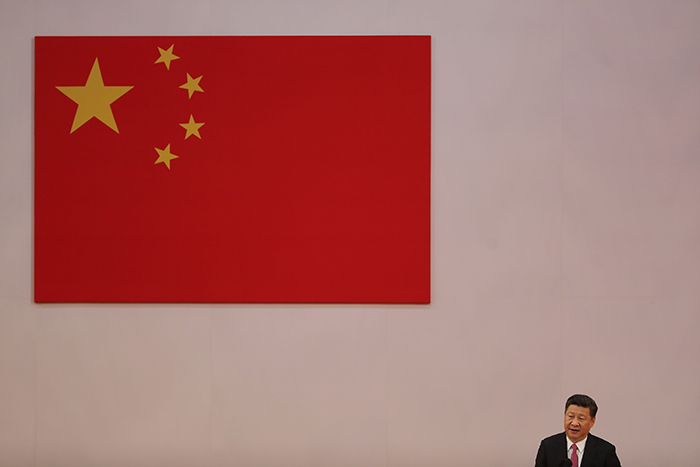Interviews / Asia-Pacific
17 December 2024
Economic Slowdown and Geopolitical Tensions: How Is China Doing?

Since the end of the Cold War, China has continuously developed its economy, military, and diplomatic apparatus, rising to become the world’s second-largest power. However, the 2020s mark a turning point in China’s dynamism. The economic aftermath of Covid-19 lingers, tensions with the US intensify, and social cohesion remains fragile. Could this slowdown in Chinese development impact the regime? What direction will the China-US confrontation take with Donald Trump’s re-election? And what role does China play on the global stage? Sinologist Emmanuel Lincot, an associate researcher at IRIS and professor at the Catholic University of Paris, provides his analysis. In February 2025, he will publish L’Asie, terre de conflits, enquête sur la nouvelle poudrière mondiale, co-authored with Barthélémy Courmont.
China faces economic difficulties: sluggish growth, deflation, and youth unemployment. To what extent is the regime’s popularity under threat?
The regime is not currently at risk, but the social fabric is severely damaged. The primary cause is the Covid-19 crisis, its aftermath, and a sharp economic slowdown, manifesting in unprecedented youth unemployment, an unfavourable economic environment due to American and European pressures, and an atmosphere of anxiety within the government. This is evidenced by unprecedented purges within the military and strategic missteps, whether regarding the fall of Bashar al-Assad’s regime in Syria or Beijing’s approach to Pyongyang drawing closer to Moscow, potentially at the expense of China’s own interests.
In addition, a severe moral crisis has emerged, marked by violent incidents described in the national press as isolated cases: a mass killing with a ramming vehicle that left at least 35 dead last month in Zhuhai, the stabbing of a Japanese student in Shenzhen in September, and knife attacks on American academics in Shenyang weeks earlier. There is, in fact, deep unease in this society. It is far from harmonious, as the regime’s Confucian ideology would suggest, but instead deeply dissonant, highly unequal, and brutalised—a phenomenon that has existed for quite some time. If we study the long-term evolution of this society, we see it has faced continuous crises for two centuries. From the Opium Wars and unequal treaties to the Japanese occupation, civil war, Maoist purges, and industrial revolution, China has endured tremendous hardship.
You might argue that our own society hasn’t been spared either, but there’s a significant difference: every generation in our society has undertaken a process of remembrance and reconciliation with its neighbours, with notable success. Is this the case in China? The answer is no. China and its society are at a critical juncture: how can one know where to go without knowing where one comes from? This is China’s core problem. It has lost its bearings and remains extremely vulnerable psychologically. Do parents talk to their children about Tiananmen (1989) and the massacre of students? Do grandparents discuss the Cultural Revolution (1966–76)? No. This leads to unconscious transmission of transgenerational traumas, to which the most fragile succumb. Tania Branigan’s book Fantômes rouges illustrates the harmful extent of this phenomenon. This repressed anger, anxiety, and frustration could one day turn against the regime.
With Donald Trump’s return to power foreshadowing continued rivalry between Washington and Beijing, how detrimental could China’s economic slowdown be in this confrontation, particularly regarding Taiwan?
Two scenarios are possible. One, though unlikely, sees the regime conceding, abandoning its rapprochement with Russia. Sanctions are lifted swiftly in this case. However, this remains improbable unless a palace revolution occurs, leading to Xi Jinping’s removal. This is because the United States has given up on normalising relations with China. Anti-China sentiment is a bipartisan consensus in America, and Washington needs adversaries. Economic warfare will therefore intensify, driven by the belief that this is the moment to cripple the opponent before it’s too late due to a growing technological gap.
The second scenario envisions the Chinese regime being cornered, much like Japan in the late 1930s, and going to war over Taiwan. The US and Japan respond, and the war escalates globally. It’s plausible that the Trump administration will favour the first scenario, at least delaying the second. For the Chinese, this marks entry into a new era. Reforms won’t halt overnight, but the era of double-digit growth, overconsumption, and belief in a brighter future is now seen in hindsight as a golden age.
In Taiwan, there is cautious optimism, but pessimists argue that Ukraine’s sacrifice may have only delayed the inevitable conflict with the island by a few years. Many feel they are on borrowed time, even concerning their American ally. Once microchip production is relocated away from Taiwan or American and European competitors establish themselves, the island will lose its main asset—its lifeline.
China has positioned itself in recent years as a mediating power (e.g., facilitating normalisation between Saudi Arabia and Iran, proposing a peace plan for Ukraine). How active is it in resolving the world’s major conflicts today?
It operates largely through bluff. Certainly, the easing of tensions between Iran and Saudi Arabia, particularly regarding Yemen, is commendable. Given the West’s limited relations with Iran and Russia’s potential conflict of interest as a petrostate, China was uniquely placed to mediate between these rival nations. Yet, with the fall of the Syrian regime, there’s nothing to prevent the Arab-Iranian rivalry from reigniting in the Middle East, where China supports Palestine and refuses to label Hamas as a terrorist organisation.
Regarding Ukraine, China’s most concrete proposal has been a ban on nuclear strikes—hardly substantive or constructive. Beijing’s initiatives lack credibility, and its rhetoric as a spokesperson for the “Global South” holds little weight.

